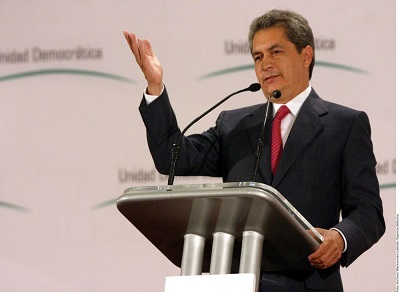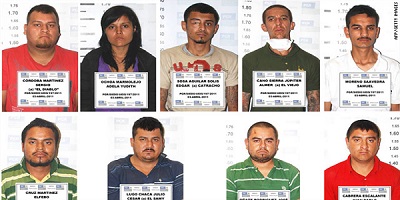RICO Case: Mexican Presidential Candidate Extradited to the Southern District of Texas
 A top politician who ran for Mexico’s President, Tomas Yarrington Ruvalcaba, 61, was extradited this week to the United States to face a number of drug-related charges, according to former U.S. drug enforcement officer Emmanuel de la Garza. Ruvalcaba, who served as the governor of Tamaulipas State, is charged in a Brownsville, Texas, indictment which includes criminal charges of racketeering, drug smuggling, money laundering and bank fraud.
A top politician who ran for Mexico’s President, Tomas Yarrington Ruvalcaba, 61, was extradited this week to the United States to face a number of drug-related charges, according to former U.S. drug enforcement officer Emmanuel de la Garza. Ruvalcaba, who served as the governor of Tamaulipas State, is charged in a Brownsville, Texas, indictment which includes criminal charges of racketeering, drug smuggling, money laundering and bank fraud.

According to the spokesman from the U.S. Drug Enforcement Administration (DEA), in April 2017, Gov. Yarrington was captured in Italy while traveling under an alias using a fake passport and other fake identification documents. He was taken into custody by Italian police on a provisional arrest warrant which followed his federal indictment handed down by a grand jury in May 2013.
Despite Yarrington contesting his extradition to the United States, the Italian criminal justice officials finally authorized his extradition to the United States last week and he arrived in the Southern District of Texas and made his first court appearance on Monday, April 23 before federal Magistrate Ronald Morgan.
The suspect was charged in the Brownsville Division of the Southern District of Texas after he fled Mexico and was classified as a fugitive for years. The indictment alleges Yarrington and Fernando Alejandro Cano Martinez, 61, the owner of a Mexican construction company, violated the U.S.federal government’s Racketeer Influenced and Corrupt Organization (RICO) statute. The two men are also charged with conspiracy to launder money, conspiracy to defraud and conspiracy to make false statements to federally insured U.S. banks.
Yarrington is also facing the charged with violating the Controlled Substances Act, as well as two counts of bank fraud and a conspiracy to structure currency transactions at a domestic financial institution.
Yarrington’s partner in crime, Cano, is charged with three counts of bank fraud.
“HSI aggressively pursues transnational criminal organizations that pose a threat to the U.S. national security, to include corrupt public officials who use their position and influence to further the illicit activity,” said Shance Folden, of Immigration and Customs Enforcement’s Homeland Security Investigations (HSI)
“HSI is committed to upholding the rule of law and investigating those involved in criminal activity and bringing the illicit gains of these crimes to the U.S,” said Special Agent in Charge Folden.
“This case highlights the impact multiple agencies can have when they join forces. DEA, HSI, IRS-CI and FBI along with our state, local and international law enforcement partners will continue to work together and pursue those who threaten our country through the smuggling and distribution of illegal and dangerous drugs such as cocaine,” said Will R. Glaspy, special agent in charge with the DEA.
“This extradition sends a global message that those accused of leveraging their political positions to conduct drug trafficking and other criminal activity will be brought to justice,” SAIC Glaspy added.
“While many U.S. political leaders and their advocacy-journalist partners play down the massive political corruption among Mexican government officials, Mexico’s crime and violence rates among the worst in a world that has several wars and rebellions in which thousands are killed,” said former NYPD Det. Iris Aquino. “These advocates for illegal aliens don’t care if they let into the country dangerous felons so long as they believe they can get their votes and allegiance,” she added.
The RICO and money laundering charges each carry sentences of up to 20 years in prison, while conspiracy to commit bank fraud carries as possible punishment up to 30 years. The drug conspiracy charges carry a term of imprisonment of at least 10 years. The currency structuring charges carry a possible five-year-term of imprisonment.
The Mexican Governor and the Drug Cartels
Yarrington served as governor of the State of Tamaulipas for five years from 1999 to 2004. Tamaulipas is located on the U.S. southern border between the United States and Mexico directly across from Brownsville and Laredo, Texas. He was a member of the Partido Revolucionario Institucional (PRI).

PRI is a Mexican political party founded in 1929 that held power uninterruptedly in the country for 71 years from 1929 to 2000, first as the National Revolutionary Party (Spanish: Partido Nacional Revolucionario, PNR), then as the Party of the Mexican …
According to a Justice Department statement, 1998 was the year that Yarrington allegedly began receiving large bribes from major drug traffickers operating in the Mexican state of Tamaulipas, including the Gulf Cartel. In return, Yarrington allegedly allowed them to operate their large scale, multi-ton enterprises freely, which included the smuggling of large quantities of drugs to the United States for distribution.
According to a press statement from the Department of Justice’s Criminal Division:
“From 2007 to 2009, Yarrington allegedly became involved in the smuggling of large amounts of cocaine through the Port of Veracruz into the United States.
“Yarrington also collected bribes from commercial operations in Mexico, according to the indictment. Cano operated Materiales y Construcciones Villa de Aguayo, S.A. de C.V., a construction firm in Tamaulipas that received significant public works contracts during Yarrington’s term as governor. The indictment alleges Cano, in turn, paid bribes to Yarrington to include the acquisition of real estate in front names for him.
“The indictment further alleges Yarrington also received control over stolen public funds in the latter part of 2004. Portions of those funds were allegedly used to buy a Sabreliner 60 airplane in January 2005. As part of that purchase, $300,000 was transferred to a bank account in the United States. Another portion of the allegedly stolen funds, $5 million Mexican pesos, was transferred to Cano in the spring of 2005, according to the indictment.

“The indictment further alleges that starting in approximately 1998, Yarrington, and later to include Cano, became involved in the acquisition of valuable assets in the United States, using front names and business entities established starting in 2005 to disguise the true ownership of the assets. The assets allegedly included bank accounts, residences, airplanes, vehicles and real estate in Bexar, Cameron, Hidalgo and Hays Counties, many of which were acquired via allegedly fraudulent loans from banks in Texas. According to the indictment, bank accounts established in front names at Texas banks were used to receive and disburse money to carry the ongoing costs of the assets, such as loan costs and condo fees.
“The indictment identifies numerous specific front entities involved in the scheme, each of which allegedly applied for multi-million dollar fraudulent loans at Texas banks, which Cano allegedly personally guaranteed. The indictment details a total of more than $7 million in transfers into the U.S. accounts of the front entities.
“Additional entities were created and used to apply for other loans to fund the purchase of still other assets, according to the indictment. Numerous currency transactions were allegedly conducted at First National Bank, headquartered in Edinburg, Texas, in a structured manner in amounts at or below $10,000 in order to evade the filing of Currency Transaction Reports by the bank.
“The RICO and money laundering charges each carry sentences of up to 20 years in prison, while conspiracy to commit bank fraud carries as possible punishment up to 30 years. The drug conspiracy charges carry a term of imprisonment of at least 10 years. The currency structuring charges carry a possible five-year-term of imprisonment.
“The indictment also includes a notice of forfeiture. Some of the assets identified in the indictment already have been seized and forfeited to the United States in civil forfeiture actions over the course of the investigation, to include approximately 46 acres in Bexar County, a condo on South Padre Island, a 2005 Pilatus airplane and residences in Hidalgo and Hays counties.”



Pingback: RICO Case: Mexican Presidential Candidate Extradited to the Southern District of Texas – USSA News | The Tea Party's Front Page